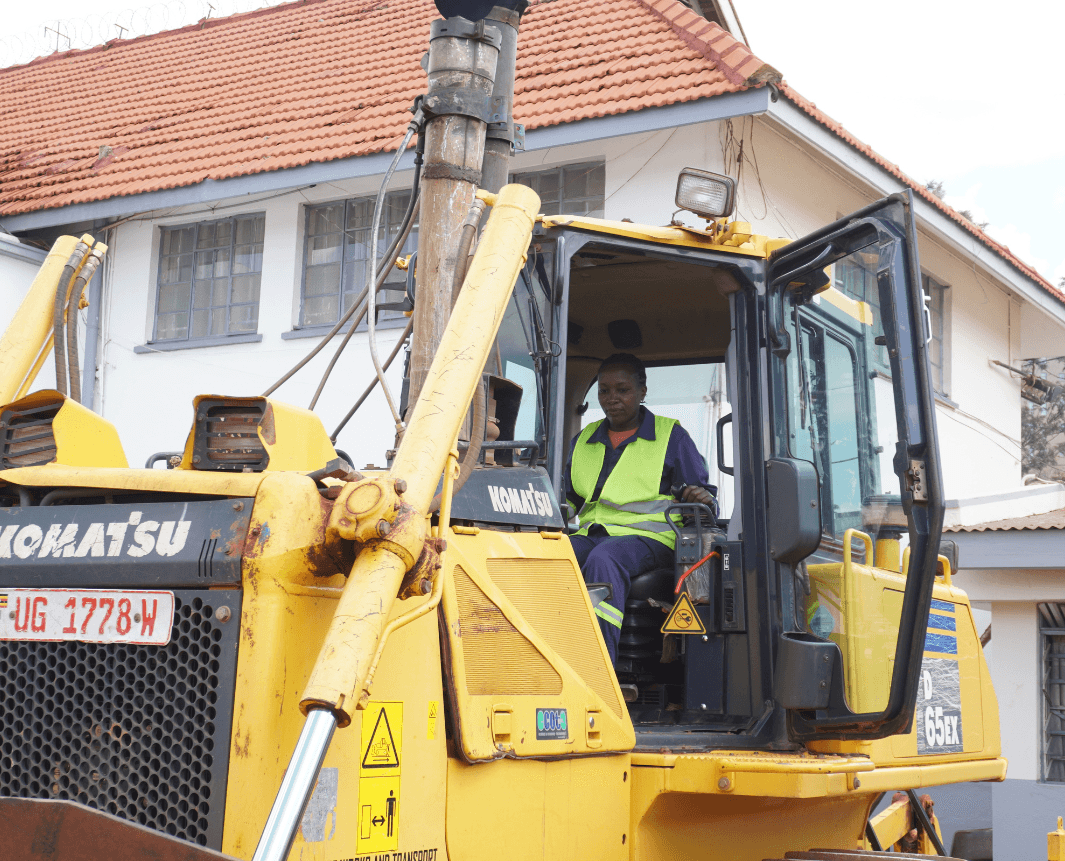TVET to support women stepping into men-dominated fields: UNIDO’s project in Uganda points the way
UNIDO and its partners have established the Mechanical Engineering Training and Advisory Centre in Uganda - the first training facility for road construction equipment operators.
- January 10, 2023
- By Sophie Nedlin
This article had contributions from Mr. Stefan Windberger, Associate Project Officer at UNIDO’s Skills Development and Fair Production Unit, and Mr. Nicolas Schmidt, Gender Unit Administrator at UNIDO’s Gender Equality & Empowerment of Women Unit.
Africa remains to be the world’s least industrialized continent, with only one country being categorized as industrial, namely South Africa. Raising awareness about the importance of its industrialization as well as providing fundamental support in structuring its infrastructure in a sustainable and inclusive way could provide the potential to generate employment and enhance productivity.

The United Nations Industrial Development Organization (UNIDO) is committed to enhancing the role of women as drivers of poverty reduction and harnessing their potential in safeguarding inclusive and sustainable industrialization, contributing directly to the 2030 Agenda. To target gender equality means not only improving women’s future perspectives but also contributing to economic growth. Studies show that economies grow faster when gender equality is advanced as fewer people remain in poverty and overall well-being increases. Globally, the gross domestic product could increase by more than 25% by 2025 if women played the same role in labour markets as men.
To unleash Africa’s full potential, industrialization must foster strong linkages to the domestic economies, capitalizing on the continent’s rich resources. This can substantially result in poverty reduction and employment creation. Today we highlight the work of a UNIDO project in Uganda that directly contributes to inclusive and sustainable industrial development in the region.
To support “Uganda Vision 2040”, UNIDO jointly with its partners, including the Government of Japan, the Government of Uganda, the Ministry of Works and Transport (MoWT), and Komatsu Ltd., have established the Mechanical Engineering Training and Advisory Centre (METRAC) in Luwero, Uganda – the first training facility for road construction equipment operators.
Addressing the skills and gender gaps
To provide Ugandan workers with the necessary industrial skills and training, METRAC seeks to invest in human capital and address the skills gap in the transport-related sector. The aim is hereby to efficiently improve Uganda’s road infrastructure by providing the country with skilled road equipment operators – a profession that is not yet taught at Uganda’s technical and vocational education and training (TVET) institutions.
UNIDO trained Uganda’s first batch of road construction equipment operator trainers. The 44 trainers will become the first ones in the country to be accredited under the new and recently approved plant operator trainer curriculum by the Directorate of Industrial Training (DIT). As a result, the trainings are of high value. METRAC has already been able to train the first batch of road construction equipment operator trainers. The 44 trainers are foreseen to become the first ones in the country to be accredited under the newly approved plant operator trainer curriculum by the DIT.
Among them were two women who initially worked for MoWT as staff in their regional mechanical workshops and were then nominated to serve as road construction equipment trainers. Alex Keshubi and Miria Nagasha have been involved in the field of road construction since an early age. Women in this area still face challenges with access to employment which further constrains their income potential.

When stepping into the field, Miria remembers the challenges she endured by telling her friends and family about her career choice: “At first, I got lectures from different people advising me to be careful… they cautioned me on challenges there but in fact, I didn’t find it very hard”. She continues by saying that women need to be continuously reminded that they are equally capable of operating a machine as men are and need to be informed about possibilities and opportunities outside of common gender stereotypes.
And indeed, women working in the road construction industry have been a rare sight. Motivating women and highlighting the opportunities that could arise from this job is extremely important to gradually move towards gender equality. In Uganda, women still lack the necessary resources that are needed in key areas such as information and communication as well as technology skills.
Alex also recognizes the drawbacks in these key areas: “We need to inform, sensitize and encourage them so that they can enter into this field. We can get some ladies who are already flourishing in the field who can do the sensitisation, visiting schools and do career guidance for students”.
Additionally, the narrative of Technical and Vocational Education and Training (TVET) needs to change. TVET is arguably the closest educational tool to the labour market, allowing students to move safely from learning to earning. Offering students the opportunity to develop real-life skills should not be missed out on.
When asked what advice she would provide to other women who want to work in this field, Alex responds: “I would advise them to go ahead with the decision. A woman can do any kind of job.”

So what do women need to step into a men-dominated field such as road construction? In Alex’s opinion, women need to be encouraged, informed, and sensitised. By spreading the word in schools, career workshops, or universities, and by improving the overall information channels this goal can be achieved. UNIDO’s Learning and Knowledge Development Facility (LKDF) promotes demand-oriented skills development programmes for people in developing and emerging industrial economies to achieve inclusive and sustainable industrial development. It recognizes that gender equity benefits economies and needs to be fostered through specialized skills training and job opportunities.